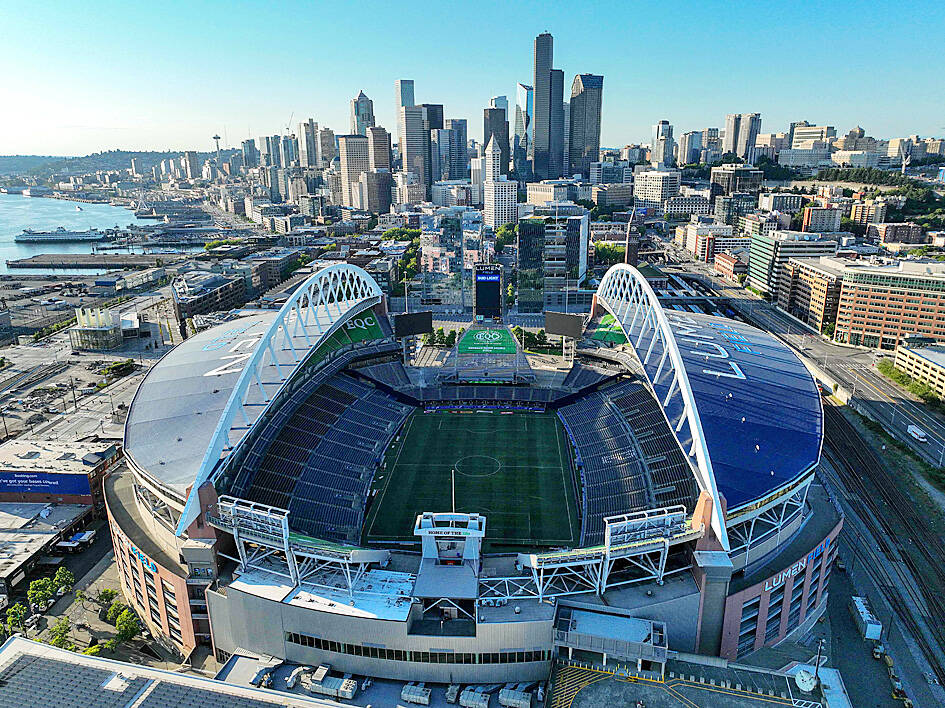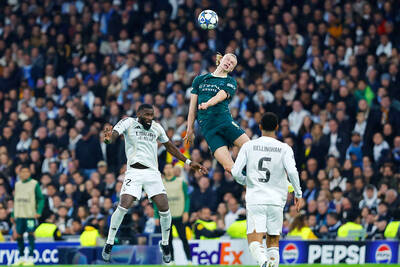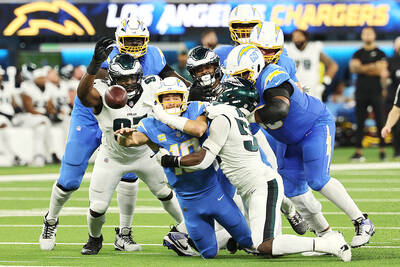The largest and most far-flung FIFA World Cup kicks off in 12 months with a record 48 teams spread across Canada, the US and Mexico, and skeptics are asking whether its frenzied growth is worth the environmental cost.
FIFA, the governing body of world soccer, like the International Olympic Committee, insists it is working to reduce the carbon footprint, but the expansion from 32 competing nations to 48, and the resulting shift to multiple hosts both next year and in 2030, leads critics to question that claim.
“Unlike the case of the Olympic Games, where the carbon footprints have been reducing over the last several editions, this is totally opposite in the case of the men’s World Cup,” said David Gogishvili, a geographer at the University of Lausanne in Switzerland and a specialist in mega-sports events.

Photo: Getty Images via AFP
While the 2022 World Cup in Qatar was certainly compact, it drew criticism for its oversized, air-conditioned stadiums built at breakneck speed in a small country with a scorching climate.
For 2026, all 16 stadiums — ranging in capacity from the 45,000-capacity Toronto Stadium to the 94,000-capacity cauldron of Dallas Stadium — already existed when the bid was made.
One problem is the distances.
Foxborough Stadium, outside Boston, is 3,700km from the Azteca in Mexico City. The BC Place Stadium in Vancouver is 4,500km from Miami Stadium. That multiplies air travel for teams, officials, media and the “more than 5 million fans” who, FIFA says “are expected to attend.”
Organizers say the 72 matches in the first round — when teams would play in 12 four-team groups — would pivot on three “regional hubs.” Yet distances will still be huge. For example, Group B has matches in Toronto as well as in Los Angeles, San Francisco, Seattle and Vancouver on the Pacific Coast.
For the 32 matches in the five-round knockout phase teams will be flying all over the map.
FIFA, whose president Gianni Infantino proclaimed his “determination” to combat global warming at COP 26 in Glasgow, Scotland, committed itself in 2018 to “measuring, reducing and offsetting” the emissions associated with its World Cups.
Yet, since it was nailed in June 2023 by the Swiss Fairness Commission for boasting of the “climate neutrality” of the 2022 World Cup, without being able to prove the claim, FIFA has refrained from making assessments or promises concerning 2026.
The only official estimate of the carbon impact — a record 3.7 million tonnes of carbon dioxide — was made before the number of matches was increased from 80 to 104.
“FIFA’s insatiable appetite towards growth,” means “more athletes, more fans, more hotel infrastructure, more flights. It’s kind of a never-ending cycle,” Gogishvili said.
A joint British report on soccer and the environment published in February by the New Weather Institute and Scientists for Global Responsibility, punningly entitled “Dirty Tackle,” said one men’s World Cup finals match generates emissions “between 26 times and 42 times that for a domestic elite game” or the equivalent of “between 31,500 and 51,500 average UK cars driven for a whole year.”
“With every game added to the football calendar, international football associations make the world less safe,” the report said.
Next year’s World Cup is not a blip.
“It seems that the environmental denial of the FIFA World Cups will continue,” wrote Gilles Pache, professor at the University of Aix-Marseille, in the Journal of Management.
He pointed to 2030 that is to open with matches in Argentina, Uruguay and Paraguay, to celebrate the centenary of the first World Cup, before switching across the Atlantic to the three hosts Morocco, Spain and Portugal for the remaining 101 matches.
The 2034 World Cup, is to be held in Saudi Arabia, in a climate comparable to that of Qatar, but with 40 more matches. Saudi giant Aramco, the world’s leading oil company, became a major FIFA sponsor last year.

The pressure was already on Real Madrid coach Xabi Alonso before their 2-1 defeat to Manchester City on Wednesday in the UEFA Champions League raised further questions about his future. Arsenal remain perfect in this season’s competition and three points clear at the top of the standings after a 3-0 win against Club Brugge, while defending champions Paris Saint-Germain were held 0-0 at Athletic Bilbao. The clash between Madrid and City was the standout game of the round amid reports this week that Alonso had lost control of the locker room. Speculation over his position is likely to intensify after the latest

‘HIGH STANDARD’: The Thunder are on track for a Finals-Cup double after they scored 22 three-pointers in equaling the best 25-game start to a season in NBA history The Oklahoma City Thunder on Wednesday bagged a 16th straight victory, thrashing the Phoenix Suns 138-89 to romp into an NBA Cup semi-final clash with the San Antonio Spurs, who stunned the Los Angeles Lakers 132-119. NBA Most Valuable Player Shai Gilgeous-Alexander scored 28 points to lead the reigning NBA champions Thunder, who improved to 24-1 to equal the best 25-game start to a season in league history. They dominated from start to finish to book their place in the final four of the in-season tournament in Las Vegas, where they are tomorrow to take on the Spurs. The New York Knicks and

TOP OF THE TABLE: Evann Guessand put the visitors ahead early in the game and Flavius Daniliuc equalized before Youri Tielemans got the winner in the second half Aston Villa on Thursday extended their winning streak to eight games in all competitions with a 2-1 victory against Basel in the UEFA Europa League to secure at least a playoff spot. Villa were tied with Olympique Lyonnais, who beat Go Ahead Eagles 2-1, and Midtjylland, 1-0 winners over Genk, atop the standings of the second-tier European competition on 15 points with five wins from six games. They have bounced back from a poor start to the season and are third in the Premier League, including a 2-1 victory over leaders Arsenal on Saturday. At St Jakob-Park in Basel, summer signing Evann Guessand

Tony Jefferson intercepted a Jalen Hurts pass in overtime to give the Los Angeles Chargers a 22-19 victory over the Philadelphia Eagles on Monday in an NFL thriller between playoff contenders. Justin Herbert, playing a week after surgery on his broken left (non-throwing) hand, withstood a career-high seven sacks to throw for 139 yards and a touchdown for the Chargers. Cameron Dicker kicked five field goals, including the 54-yard game winner in overtime. The Chargers defenders forced Hurts to throw four interceptions and surrender a fumble for a career-worst five turnovers as the Eagles fell to 8-5 with a third